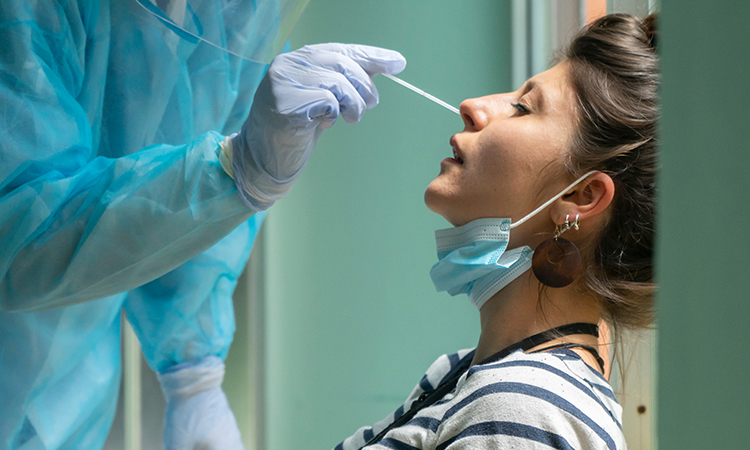Aviation bodies intensify calls for testing to replace quarantine in Europe
- Like
- Digg
- Del
- Tumblr
- VKontakte
- Buffer
- Love This
- Odnoklassniki
- Meneame
- Blogger
- Amazon
- Yahoo Mail
- Gmail
- AOL
- Newsvine
- HackerNews
- Evernote
- MySpace
- Mail.ru
- Viadeo
- Line
- Comments
- Yummly
- SMS
- Viber
- Telegram
- Subscribe
- Skype
- Facebook Messenger
- Kakao
- LiveJournal
- Yammer
- Edgar
- Fintel
- Mix
- Instapaper
- Copy Link
Posted: 6 October 2020 | International Airport Review | No comments yet
After urging the European Commission to implement COVID-19 testing in September, three aviation bodies have intensified the calls for replacing quarantine requirements prior to the holiday season in order to support the recovery of the industry.


With less than 90 days to go before the year-end holiday season, European aviation bodies have intensified their call to replace quarantine measures with passenger testing. This will provide far greater assurance and ability for
cross-border travellers to plan family reunions or vacations during this important holiday period. It will also serve as a lifeline to the millions of workers in the travel and tourism sectors whose jobs remain at risk.
Following their direct call to action together with the wider travel and tourism sectors in a letter to European Commission (EC) President Ursula von der Leyen on 17 September 2020, aviation bodies Airports Council International (ACI) Europe, Airlines for Europe (A4E) and the International Air Transport Association (IATA) have submitted a framework for how an EU-wide Testing Protocol for Travel (EU-TPT) could work.
In follow up letters sent to the Commission President and Heads of State, as well as Health Ministers across Europe, on 1 October 2020, the industry associations set out their proposal for harmonised pre-departure testing from high-risk areas, describing the current situation of patchwork quarantine restrictions as “unsustainable”.
Aviation industry data confirms the worsening situation. IATA figures show that air traffic to, from and within Europe is down by 66.3 per cent when compared to 2019. The latest figures from ACI Europe reveal that, as of 27 September 2020, passenger traffic in the European Union (EU) had further plunged by 78 per cent.
New research released by the Air Transport Action Group (ATAG) on the impact of COVID-19 restrictions suggests that the collapse of air traffic could result in a 52 per cent drop in employment supported by aviation in Europe, equating to the loss of around seven million jobs. Nearly €450 billion in economic activity will be lost. Urgent action is therefore required to prevent an even greater economic and employment catastrophe.
“We need to learn to live – and travel – with the virus”, says the letter. “Re-establishing the free movement of people and air connectivity across our continent in a safe way must be a priority”.
With many Europeans wondering whether they will be able to come together with their families and loved ones for the holiday season, the proposed testing protocol would allow for this to happen in a safe and harmonised way. The associations reiterate their calls for the European Commission and Member States to prioritise the development and implementation of the European Testing Protocol for Travel system.
The letter highlights the continually worsening outlook for passenger demand, along with cripplingly low forward bookings for the winter season – down by 80 per cent from 2019. The planning certainty and risk-based safety of a common testing protocol would give European countries an effective way to reduce transmission both in communities and during air travel whilst stimulating the economy.
The proposed framework is based on two overarching principles:
- Quarantines must be replaced by testing prior to departure, based on an EU Testing Protocol for Travel which is consistently applicable for passengers travelling across borders from high risk areas in the EU/Schengen space and from third countries. Public opinion research has established that 65 per cent of travellers surveyed agree that quarantine should not be required for passengers who test negative for COVID-19
- Travel restrictions must be coordinated and based on a common risk assessment. This supports the risk assessment criteria and the common colour coding system/mapping of designated areas already proposed by the European Commission, but which is yet to be endorsed and fully implemented by EU States.
In concluding their recommendations, ACI Europe, A4E and IATA unequivocally state their position that adoption by European States of a common testing protocol would further reduce transmission risks, restore confidence among the travelling public and protect livelihoods by allowing the travel and tourism sectors to begin their recovery.
As a result, they urge immediate action from the European Commission and States to urgently address this issue at EU level and accelerate this process.
Related topics
Aeronautical revenue, Airport crisis management, COVID-19, Economy, Passenger experience and seamless travel, Passenger volumes, Regulation and Legislation, Safety
Related organisations
Air Transport Action Group (ATAG), Airlines for Europe (A4E), European Commission (EC), European Union (EU), International Air Transport Association (IATA)


















